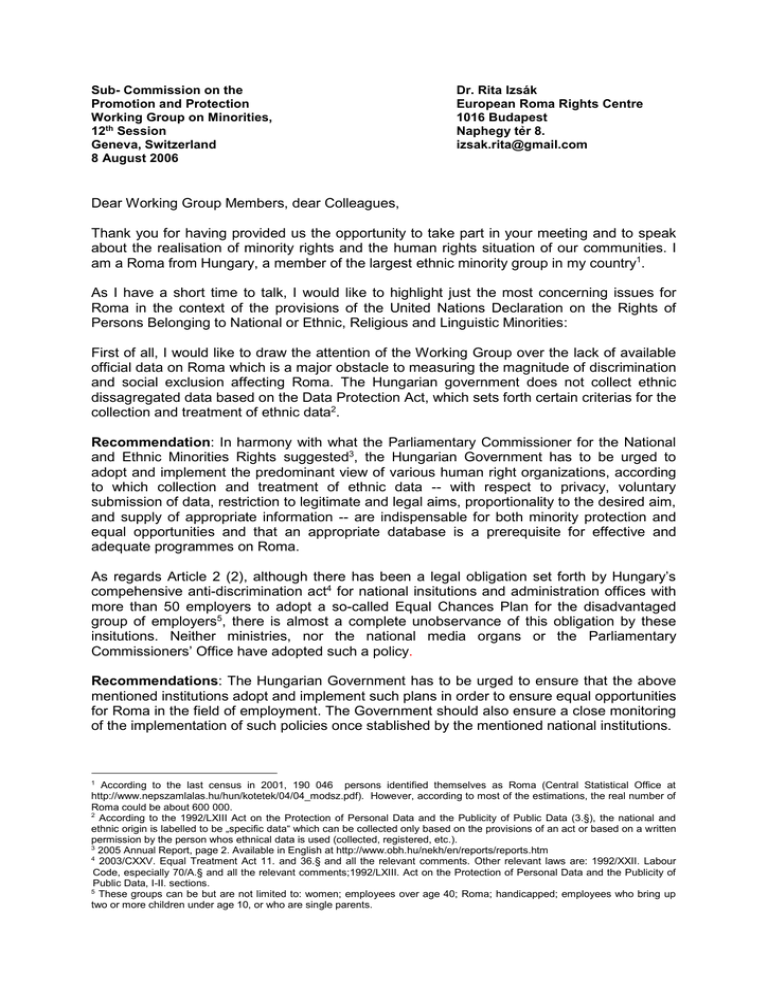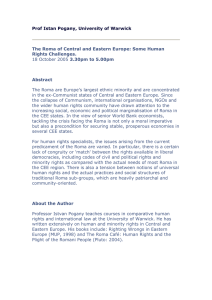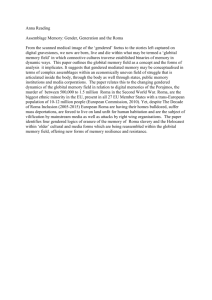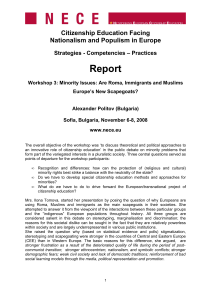Sub- Commission on the Dr. Rita Izsák Promotion and Protection
advertisement

Sub- Commission on the Promotion and Protection Working Group on Minorities, 12th Session Geneva, Switzerland 8 August 2006 Dr. Rita Izsák European Roma Rights Centre 1016 Budapest Naphegy tẻr 8. izsak.rita@gmail.com Dear Working Group Members, dear Colleagues, Thank you for having provided us the opportunity to take part in your meeting and to speak about the realisation of minority rights and the human rights situation of our communities. I am a Roma from Hungary, a member of the largest ethnic minority group in my country1. As I have a short time to talk, I would like to highlight just the most concerning issues for Roma in the context of the provisions of the United Nations Declaration on the Rights of Persons Belonging to National or Ethnic, Religious and Linguistic Minorities: First of all, I would like to draw the attention of the Working Group over the lack of available official data on Roma which is a major obstacle to measuring the magnitude of discrimination and social exclusion affecting Roma. The Hungarian government does not collect ethnic dissagregated data based on the Data Protection Act, which sets forth certain criterias for the collection and treatment of ethnic data2. Recommendation: In harmony with what the Parliamentary Commissioner for the National and Ethnic Minorities Rights suggested3, the Hungarian Government has to be urged to adopt and implement the predominant view of various human right organizations, according to which collection and treatment of ethnic data -- with respect to privacy, voluntary submission of data, restriction to legitimate and legal aims, proportionality to the desired aim, and supply of appropriate information -- are indispensable for both minority protection and equal opportunities and that an appropriate database is a prerequisite for effective and adequate programmes on Roma. As regards Article 2 (2), although there has been a legal obligation set forth by Hungary’s compehensive anti-discrimination act4 for national insitutions and administration offices with more than 50 employers to adopt a so-called Equal Chances Plan for the disadvantaged group of employers5, there is almost a complete unobservance of this obligation by these insitutions. Neither ministries, nor the national media organs or the Parliamentary Commissioners’ Office have adopted such a policy. Recommendations: The Hungarian Government has to be urged to ensure that the above mentioned institutions adopt and implement such plans in order to ensure equal opportunities for Roma in the field of employment. The Government should also ensure a close monitoring of the implementation of such policies once stablished by the mentioned national institutions. 1 According to the last census in 2001, 190 046 persons identified themselves as Roma (Central Statistical Office at http://www.nepszamlalas.hu/hun/kotetek/04/04_modsz.pdf). However, according to most of the estimations, the real number of Roma could be about 600 000. 2 According to the 1992/LXIII Act on the Protection of Personal Data and the Publicity of Public Data (3.§), the national and ethnic origin is labelled to be „specific data“ which can be collected only based on the provisions of an act or based on a written permission by the person whos ethnical data is used (collected, registered, etc.). 3 2005 Annual Report, page 2. Available in English at http://www.obh.hu/nekh/en/reports/reports.htm 4 2003/CXXV. Equal Treatment Act 11. and 36.§ and all the relevant comments. Other relevant laws are: 1992/XXII. Labour Code, especially 70/A.§ and all the relevant comments;1992/LXIII. Act on the Protection of Personal Data and the Publicity of Public Data, I-II. sections. 5 These groups can be but are not limited to: women; employees over age 40; Roma; handicapped; employees who bring up two or more children under age 10, or who are single parents. As far as Article 2 (3) is concerned, the recent amendment of the Minority Act 6 introduced the obligatory registration of members of minority for the local minority elections in order to avoid those non-members of minority could vote and be elected as minority representatives7, a situation that happened often prior to the amendment of the mentioned act. Despite this important amendment, we are seeing some of the difficulties for its correct implementation. According to the amendment, an election can be announced if the number of minority electors on the registers exceeds 30. The next local elections will take place on 1 October 2006, the deadline for registration was 15 July. According to the National Electorate Committee, 195 000 citizens registered themselves as minorities8 which means that minority elections will be held in 1448 self-governments which is less than the number of currently existing 1800 minority self-governmets. According to the amendment, minorities have to get registered at the notary and it is of high concern that minorities are not comfortable with this solution and as a result, less minority representatives will be appointed, and in a smaller number of self-governments. Recommendation: Repeating what the Parliamentary Commissioner for the National and Ethnic Minorities Rights has suggested9, the Hungarian Government has to be urged to place the new legal provisions, including compilation of an electoral register, within the competence of a committee composed of members of the minority communities instead of the leader of the election office. As regards Article 4 (1), the Ministry of Education established an Office of Ministerial Commissioner on the Integration on Roma and Disadvantaged Children which introduced a system of financial supports for schools for the integration and development of Roma children. However, the financial grants have to be saught by the municipalities and if they are eligible, the money is transferred to the municipality which reportedly often misuse the money and spends it on different purposes. Recommendation: The Hungarian Government has to be urged to adopt an adequate monitoring system on the spenditure of municipalities and to ensure that the money saught for education purposes is spent on the education of children and is not used as a supplementary financial resource of the municipality. As regards Article 4 (4), there are currently very limited efforst made -- and only since 2000 in school text books -- to educate people on the history and culture of Roma. Not once, text books had to be withdrawn because they contained extremely negative and stereotypical image of Roma, sometimes introducing them as thieves or parasits of the society who are reluctant to work and who prefer to live on social benefits. Recommendation: The Hungarian Government has to be urged to introduce compulsory textbooks that include the history and culture of Roma and are written in co-operation with or by Roma people. Compulsory primary and secondary school education should include the promotion of human rights; tolerance, pluralism, non-discrimination, effective participation etc. Hungarian national TV - and radio channels should be encouraged to broadcast programmes about Roma that give a correct picture and information about the lives, culture, customs and traditions of Romani people. 6 The Parliament approved the CXIV Act of 2005 on the Election of Minority Self-Government Representatives and Modification of Certain Acts on National and Ethnic Minorities at its session on October 17, 2005. 7 Note: In Jászladány in 2003, the establishment of a privat elite school for ethnic Hungarians had to be and was authorized by the local Roma Self-Government, where four out of five members were non-Roma. The establishment of the privat school led to racially segregated educational system in the town. 8 103 000 Roma, 45 000 German, 15 000 Slovak, 11 000 Croatian, 4200 Romanian, 2900 Polish, 2500 Russin, 2400 Greek, 2200 Armainan, 2100 Serbian, 2000 Bulgarian and 1000-1000 Slovenien and Ukrainian. 9 2005 Annual Report, page 5. Available in English at http://www.obh.hu/nekh/en/reports/reports.htm As far as Article 5 (5) in concerned, according to the World Bank, 54.9 percent of Romani households in Hungary do not have access to hot running water, 34.7 percent do not have access to cold running water, 66.6 percent do not have adequate sewerage, 49.8 percent do not have bathrooms or showers in their homes, 50.1 percent do not have indoor toilets and 13.2 percent have one or more member sleeping on earthen floors in their homes.10 These data give us deep concerns about the participation of Roma in the economic progress and development of the country. Recommendation: The Hungarian Government should be urged to adopt specific and adequate programmes in order to eliminate the extreme poverty and provide access to basic services of Romani households. Given the limited time frame I had, I am more then happy to answer your question and provide you more detailed information if needed. Thank you very much for your attention! 10 See Ringold, D., Orenstein, Mitchell A., and Wilkens, Erika. Roma in an Expanding Europe: Breaking the Poverty Cycle. The World Bank: Washington, D.C. 2003, p. 37.






